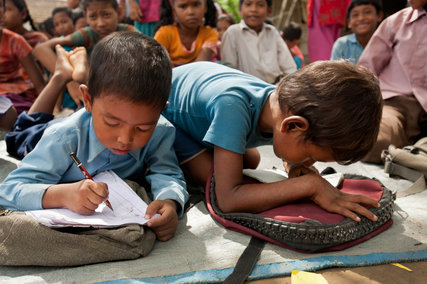In America, the majority of children eagerly await their summer break. They look forward to enjoying the time when there are no obligations related to school. Many are unaware of the privilege of having an education; some even think the school year is a burden, while others spend their time in summer enriching themselves.
In contrast, only 46.8% of children in Latin America complete their high school education compared to 86.7% in the United States. They don’t have the same benefits as many American children who look forward to summer vacation. Due to poverty and the severe inadequacies in government support for children’s education in Latin America, kids are unable to receive their fundamental right to education. And for those that do, the challenges of poverty resurface, forcing them to drop out of school and find employment abruptly in an attempt to support their afflicted family.
The ability to receive a quality education creates a clear divide between the rich and the poor in Latin America. The unfortunate children on the other side of the line struggle to learn how to read and write, which leads them to not qualify for prosperous jobs. Severe inequities perpetuate a poverty cycle. Unable to access proper education, these children grow up to be adults who subsequently bring up children who also face similar struggles, continuing the cycle of poverty.
Additionally, Latin America was the area most severely affected by the COVID-19 pandemic, which caused many school closures. Even though we are out of the pandemic, it is still challenging to get these students the education required and return to normalcy due to countries’ lack of resources. Even the kids lucky enough to attend school frequently struggle to get enough supplies. In several of these countries, buying school supplies is not a yearly ritual, and many children are lucky to own a bookbag at all. For these kids, going to school is a hardship in every way, including getting the materials they need for the entire school day. Finding qualified educators to instruct these receptive minds also becomes difficult, particularly in underprivileged areas where many people lack the necessary skills. Furthermore, children’s transit to the schools is often troublesome due to the rural seclusion in some areas. Families often find themselves contributing to the truancy of the children, as the students often forego attending school altogether due to the family’s inability or stagnation in their efforts.
By giving something that is so important more focus and resources, many of these problems could possibly be resolved. These kids are the future’s most valuable resource, yet they aren’t receiving the education ideal to succeed in life and improve the communities in which they live. The Latin governments must fund school infrastructure and guarantee equitable resource distribution. Everyone should be able to learn, regardless of their financial situation. Efforts should be made to support children from low-income families and to provide them with high-quality education and whatever flexibility they may require. It is time the governments take a serious approach to the growing problem of inadequate education. After all, as more people gain an education, more prosperity will be brought to these nations.
The education of these young people deserves our investment, and even though we in America reside far from them, we can still contribute by researching educational initiatives that we can support financially and in other ways. Individuals possessing financial resources and power ought to consider investing. Even though going to school can be stressful, knowledge and growth serve as the cornerstone for all future endeavors, and when these things are denied to children, their life’s foundation begins to splinter. Those of us who have the privilege of an education must understand its value and remember that many of our peers worldwide, especially in Latin America, don’t have what we have. We must do our part to assist the unlucky by speaking up and pushing governments to prioritize the right of every child to have an education so we can uplift societies from poverty.
![]()
- United States
